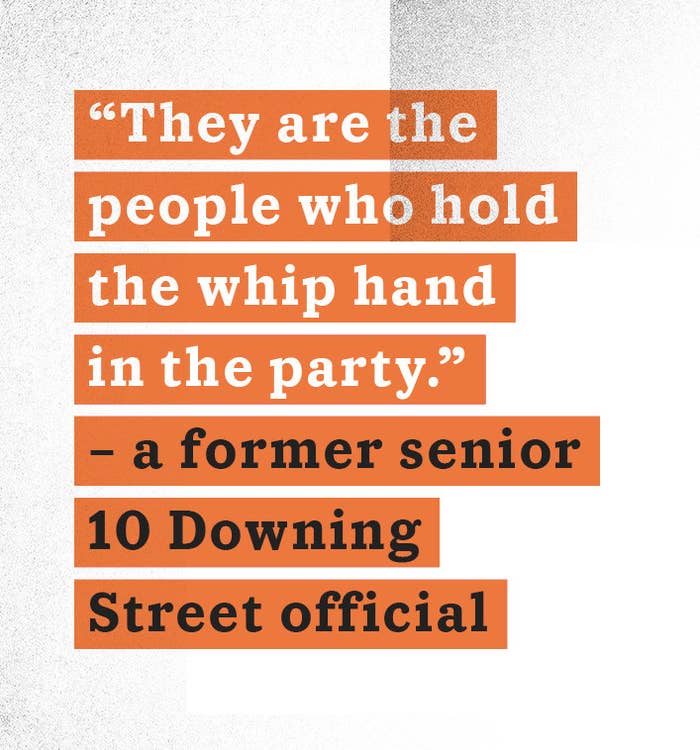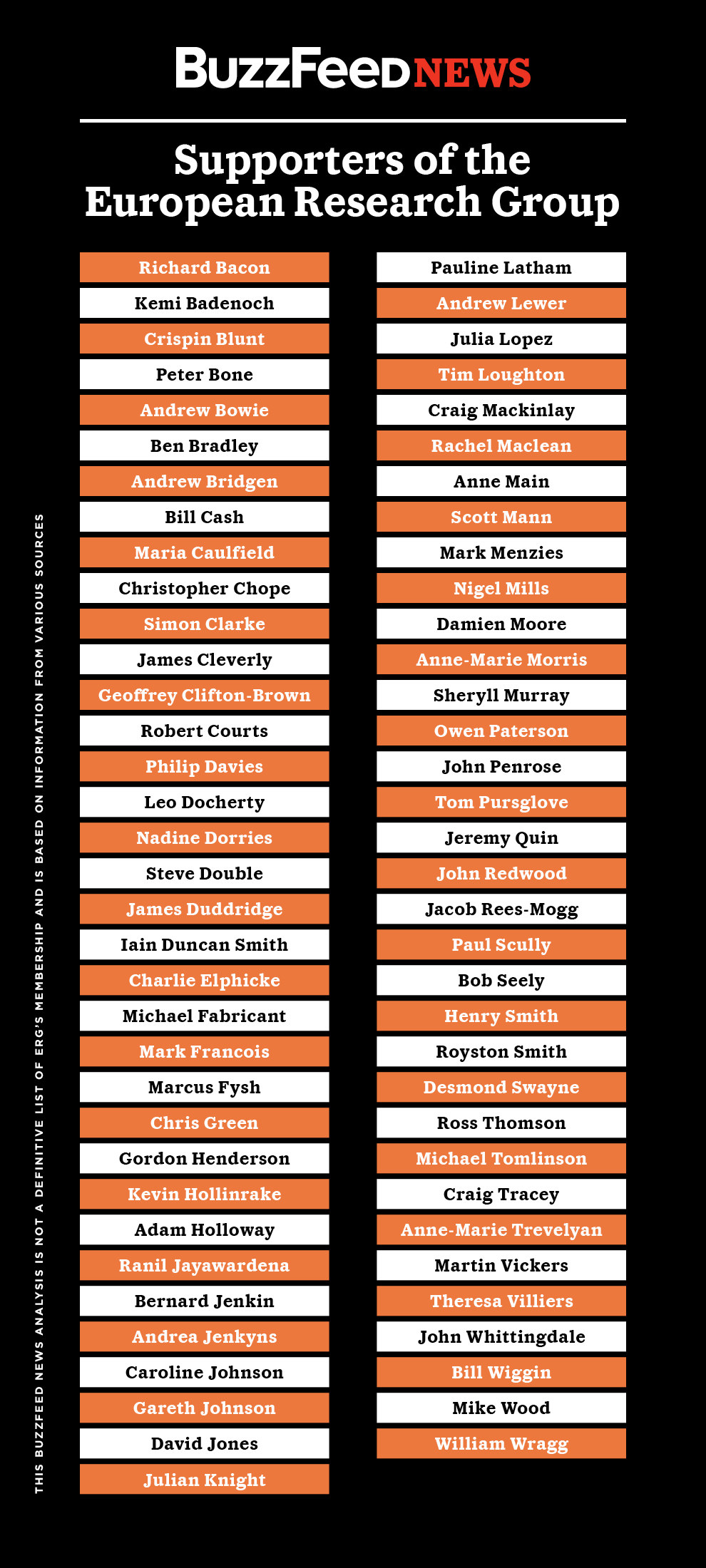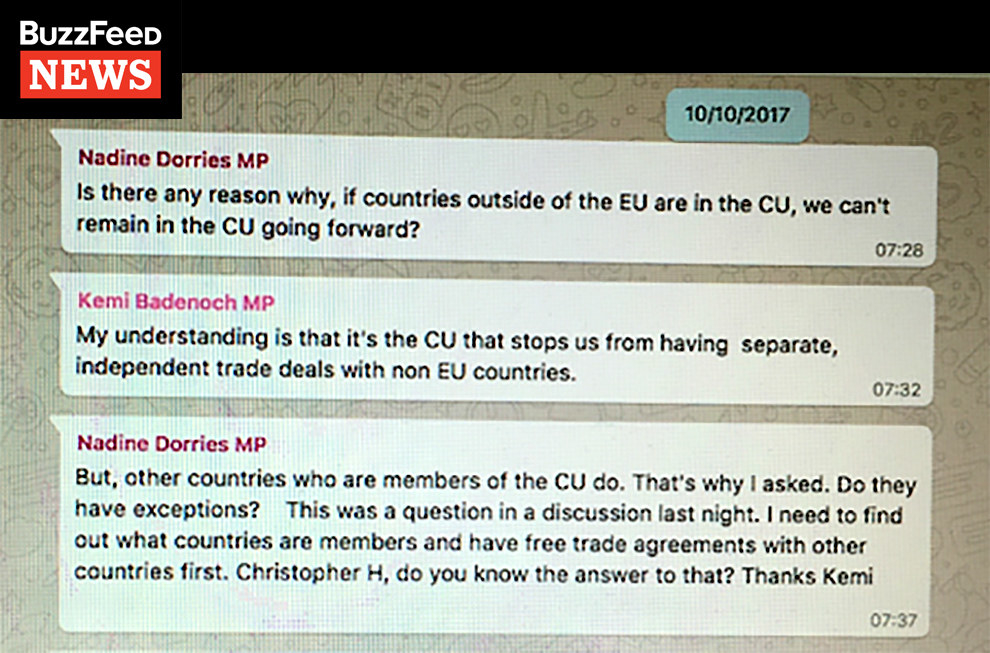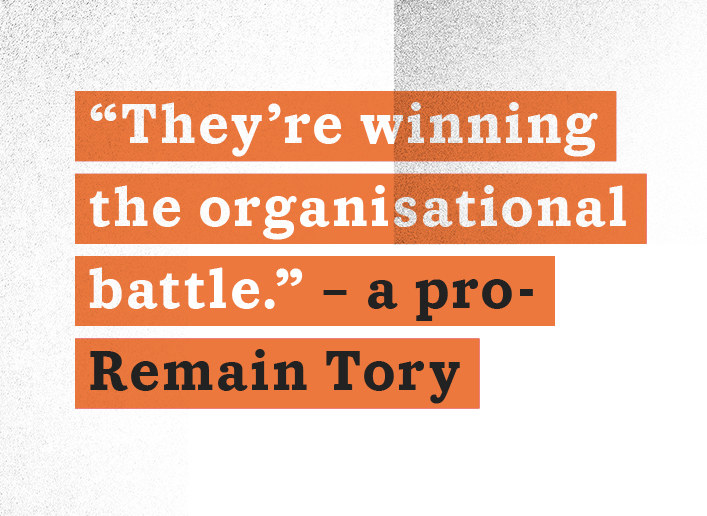As Theresa May’s government decides the UK’s future trading relationship with the European Union, no group outside cabinet has more sway over its deliberations than an informal alliance of Conservative Eurosceptics now led by Jacob Rees-Mogg.
The European Research Group (ERG) has been the most influential lobbying force in Westminster since Britain voted to leave the EU a year and a half ago, pushing May towards a hard Brexit by running an aggressive, disciplined, and highly organised parliamentary and media operation. Now, with the Brexit talks entering a critical new phase, the group has burst into the national spotlight.

First it ramped up the pressure on May to make a clean break from the EU, including fully withdrawing from the customs union. Then it led the pushback against the secret government analysis leaked to BuzzFeed News, which suggested Brexit will be bad for the UK economy under every scenario examined. Anna Soubry, the most outspoken of the Tory Remainers, claimed a clique of “35 hard ideological Brexiteers” are holding May to ransom and urged her to throw them out of the party. Newspaper reports claimed the ERG is ready to overthrow the prime minister if she crosses its Brexit red lines.
The Brexiteer caucus has done more to shape the UK’s Brexit policy than the official Labour opposition, the army of lobbyists employed by the City, big business, and trades unions, and the smaller group of committed Remainers on the Conservatives’ opposite flank. “They are the people who hold the whip hand in the party,” said a former senior 10 Downing Street official with close knowledge of the Brexit process.
But as the group’s visibility has dramatically increased, so have the questions about the extent of its support, its funding, and its contacts with government. Even in Westminster, it remains a mostly spectral organisation. A tight-knit inner circle, fronted since January by Rees-Mogg, coordinate discreetly in their offices in the House of Commons, working back channels to 10 Downing Street and the Brexit department. A wider network of supporters liaise through WhatsApp. The ERG has rarely been penetrated by outsiders, suffering only a handful of leaks. It has barely any presence online. There’s no register of its contacts with ministers and government officials. Even its membership is a mystery, with estimates varying wildly.
But now a new analysis by BuzzFeed News, based partly on unprecedented access to ERG sources, has identified about 70 MPs who are part of the informal network of committed Brexiteers — twice as many as Soubry claims, and at the upper end of newspaper estimates. We believe this figure to be conservative.
The analysis illustrates why the ERG has exerted such influence over the Brexit process — and why it is so feared by 10 Downing Street. The size of its parliamentary base, as calculated here, is more than five times May’s working majority in the House of Commons. The group has easily enough members to trigger a leadership contest if it turns against the prime minister, and enough to have a major influence on the outcome of that contest when it happens.

Senior figures in the group include the former party leader Iain Duncan Smith, former cabinet ministers Theresa Villiers, Owen Paterson, and John Whittingdale, and chair of the Commons public affairs committee Bernard Jenkin. They appear regularly on the major political TV and radio shows and in newspapers to make the case for a hard Brexit.
There are also dozens of lesser-known MPs involved with the ERG. They do not appear regularly in the media like the group’s leaders, and their participation is much harder to identify, but they are nevertheless firmly committed to a hard break from the EU.
They include Ben Bradley, the Conservatives’ new vice-chair for youth, and Maria Caulfield, who was appointed by the party in January to represent women. Also in this group are Michael Tomlinson, a parliamentary aide to Penny Mordaunt, the international development secretary; Ranil Jayawardena, who holds the safest Conservative seat in the country, North East Hampshire; and Paul Scully, the Sutton and Cheam MP who is spearheading the Conservatives’ campaigning in London.
The caucus also includes MPs who campaigned to stay in the EU but aligned with colleagues pushing for a hard Brexit after the referendum, including Charlie Elphicke, Kevin Hollinrake, and John Penrose.
The ERG's network of committed Brexiteers also includes some MPs who would be considered at home in the party's modernising wing, such as the Conservatives' deputy chairman James Cleverly, and its vice chair for candidates Kemi Badenoch.

The list is not definitive. Pinpointing the ERG's membership precisely is difficult, even with access to inside information, because of the group’s informal structure and varying interpretations of what level of participation constitutes membership. Some active participants disputed they are members because they do not formally subscribe to the ERG’s research.
However, it is the most comprehensive attempt so far to quantify the extent of the ERG’s support on the back benches.
The list includes active members of the ERG’s main WhatsApp channel, MPs who are known to have attended the group’s meetings, and others who added their names to letters sent by its leaders lobbying on Brexit policy. Some on the list contributed money to the ERG that they then claimed back from taxpayer-funded parliamentary expenses, which are publicly disclosed. Others on the list were identified as part of the “ERG team” in an internal communication circulated by one of its administrators and seen by BuzzFeed News.

The list may underestimate the size of the ERG’s network. BuzzFeed News identified other Tory MPs who have some connection to the ERG, but excluded them if there was insufficient other evidence that they are committed to the ERG’s Brexit positions.
While the ERG is a backbench lobby group, its network of sympathisers extends into cabinet, ministerial departments, and the government whip’s office. Michael Gove, the environment secretary, and Dominic Raab, the new housing minister, were active supporters before being promoted. The ERG’s two most recent chairs before Rees-Mogg, Steve Baker and Suella Fernandes, are ministers in the Brexit department. David Davis’s chief of staff, Stewart Jackson, was actively involved before losing his seat as an MP at the general election last year. The list of 70 MPs identified by BuzzFeed News as ERG supporters does not include any of these current ministers.
According to the evidence seen by BuzzFeed News, the ERG hasn't used campaign tactics that its rivals on the opposite of the Brexit debate haven't also deployed – they've just been better at it, as even Remain-voting Tories grudgingly concede. “They’re winning the organisational battle,” one MP said.

The ERG was formed by the former Tory MP Michael Spicer in 1993 to represent backbenchers who were concerned that the EU was turning into a federal superstate. The prominent Leave campaigner and author Daniel Hannan was its first researcher and coordinator.
In 2016, after the UK voted to leave the EU, the group was relaunched by Baker, the Conservative MP for Wycombe, who was a leading figure in the Vote Leave campaign. After unexpectedly winning the referendum, Baker and other veteran Tory Eurosceptics were determined to stop the government backsliding on the result. A former Royal Air Force engineer, Baker brought military-style discipline to the operation, acting as an unofficial extension of the Tory whips’ office.
In the real Tory whips’ office, the group was known as "the Taliban", according to Fall Out, Tim Shipman's book about last year's general election.
Coordinating dozens of supporters through a WhatsApp channel labelled the “ERG DExEU/DIT Suppt Group”, in reference to the two Whitehall departments set up to deliver Brexit, Baker and his colleagues were ruthlessly effective at holding May’s government to the approach the prime minister set out in her Lancaster House address last year: withdraw from the EU’s single market and customs union, end free movement of people, and stop European judges presiding over British matters.
Occasionally, the members vented frustration at institutions or individuals they saw as insufficiently committed to their vision of Brexit: Tony Blair, the BBC, civil servants, chancellor Philip Hammond, Bank of England governor Mark Carney, Remainers in their own party. More often that not, however, the campaigning activity is far more mundane than the shadowy scheming and plotting portrayed in some of the media coverage.
In the encrypted WhatsApp channel, the MPs shared links to each other’s articles, coordinated letters and media appearances, agreed “lines to take” on key topics, and circulated research on Brexit policies. “The forum is a space where issues surrounding Brexit and the negotiations are discussed openly between colleagues,” Andrew Bowie, the MP for West Aberdeenshire and Kincardine, told BuzzFeed News.
Aides to David Davis and Liam Fox used the ERG to make sure they had supportive MPs present at parliamentary debates. Senior ERG figures hosted drinks with ministers in their private offices where ERG supporters could get briefings about legislation and policies. Tory whips and aides in 10 Downing Street regularly met and spoke to the ERG’s leaders to keep them in the loop on the Brexit talks, and to make sure their supporters were on side.
In September, for example, days before Theresa May delivered a keynote speech about Brexit in Florence, Bernard Jenkin was briefed on its contents after cabinet ministers. He then relayed the gist of the speech reassuringly to colleagues in the wider group, according to sources close to the ERG.
One of the ERG’s most powerful assets is its ability to keep dozens of potentially rebellious MPs on message, quashing dissent before it emerges. At several moments in the last year when May’s authority was undermined, such as her disastrous speech at the Tory conference in Manchester in October, senior figures in the ERG quickly dissuaded their supporters from airing reservations about their party leader publicly.

The ERG’s importance to the government was underlined after the election, when Baker, its leader, was promoted to be a minister in the Brexit department. He was replaced as ERG chair by Suella Fernandes, a 37-year-old barrister who has since also been made a minister in the Brexit department. Baker came under fire in September when the Times revealed that he was still active on the ERG’s WhatsApp group and had thanked its members for signing a campaigning letter that sought to influence government policy. Baker left the WhatsApp channel later that month.
In public, the ERG stayed mostly loyal to May as the Brexit talks unfolded in the second half of last year, even while the government made several concessions to the EU that crossed the ERG’s red lines and made many of its supporters deeply anxious – including agreeing an exit payment of around £40 billion and the continuation of EU rules under a two-year transition period.
Privately, some members of the group expressed deep reservations about the government’s approach, arguing that the Tories would be punished by angry Leave voters at the next election if they allowed free movement of EU citizens to continue. Some urged May to walk away without a deal. For the most part, though, members kept their reservations to themselves, calculating that May was still their best chance of getting a hard Brexit.
In recent weeks, however, the supporters have become increasingly agitated as the Brexit phases moves into a new phase. Tensions between the backbenchers and 10 Downing Street have grown amid fears that the UK has given too much away and that Remainers in the cabinet are trying to force May to retain the status quo. After decades of fighting the EU, some Brexiteers are genuinely worried that they'll be betrayed by their party leadership, according to sources familiar with their thinking.
The replacement in January of Fernandes with Rees-Mogg after her promotion to a ministerial post in May’s New Year reshuffle has also increased its profile. The ERG’s new leader has been far more outspoken and visible than his predecessors. In a series of interviews, Rees-Mogg declared that the group will not tolerate staying in the customs union and attacked Philip Hammond. Although Rees-Mogg has insisted the group is loyal to May, many in Westminster believe the ERG will quickly abandon her if she backslides.
Last week, when BuzzFeed News revealed the secret Whitehall analysis suggesting that Brexit will leave the UK economy worse off under every scenario modelled, the ERG led the pushback. Jenkin, Duncan Smith, Rees-Mogg and other supporters challenged the document in parliament and media interviews. Representing the government at the despatch box, Baker, the ERG’s former leader and intellectual architect, downplayed the significance of the document and did not dissent when Rees-Mogg claimed civil servants in the Treasury were deliberately trying to undermine Brexit.

As the ERG’s profile has increased, so has the pressure on the group to reveal information about its funding, motivations, connections to government, and membership.
The activist website Open Democracy has published several articles trying to establish the extent of its support. The BBC’s political research unit tried to identify its membership, using public sources, but it was only partially complete. Anna Soubry put the number of Tories lobbying for a hard Brexit at only 35, arguing that their influence on the government was outsized. Various newspaper articles put the group’s membership at between 40 and 80.
In an interview with Channel 4 News last month, Rees-Mogg said there were two levels to the ERG.
The first layer comprises a group of around 20 MPs who pay an annual fee of £2,000 for access to the ERG’s research on Brexit. These MPs are identifiable because they claim the expenditure back on parliamentary expenses, which then has to be disclosed because it is public money. According to the latest records available through the Independent Parliamentary Standards Authority, 18 Tories claimed a total of £36,000 in 2017, including Gove and Duncan Smith.
This does not give a complete list of the ERG’s supporters, however, and is misleading taken on its own, since some of the MPs who have subscribed to ERG research over the years don’t agree with the group’s hard-Brexit positions — like Jonathan Djanogly, a former subscriber who was one of the 15 Tories labelled “mutineers” on the front page of the Daily Telegraph for supporting an amendment to the EU Withdrawal Bill.
There’s another, wider group of ERG supporters, Rees-Mogg told Channel 4 News. This group is broadly Eurosceptic and supports the hard-Brexit approach May set out at Lancaster House last January. It is informal and its membership “waxes and wanes”, Rees-Mogg said: “We don’t actually have a formal membership list. We just have a lot of people who are sympathetic.”
Pressed by Channel 4’s Krishnan Guru-Murthy, Rees-Mogg declined to name this wider group of sympathisers, saying the bureaucracy of compiling a list regularly would be beyond the ERG’s resources.
Jacob Rees-Mogg on the possibility of voting with Labour against the Brexit deal, his problem with the Chancellor a… https://t.co/S20PxdTliA
A list of the members of the ERG’s main WhatsApp group provides a broad outline of the group’s wide network. According to BuzzFeed News’ sources, around 90 MPs belong to the channel. This is not a definitive list of the ERG’s supporters, however, since some MPs who belong to the ERG don’t use WhatsApp and some of those who were added to the WhatsApp channel don’t appear to be active in it, or to agree with the ERG’s positions. Members have included Paul Masterton, the Scottish Tory MP accused of being a “mutineer” by the Daily Telegraph after he voted against the EU Withdrawal Bill.
One MP in the WhatsApp group, Will Quince, denied being an ERG member when approached for comment. “I am a member of several WhatsApp groups but that is very different from membership of a group,” he told BuzzFeed News.
Other sources were used to identify ERG supporters. These included an open letter sent by ERG leaders to Donald Tusk, the president of the European Council, in November 2016. The letter, urging Tusk to guarantee the rights of expatriates after Brexit, was signed by 59 MPs, including Baker, Gove, Raab, Duncan Smith, and James Cleverly, the Conservatives’ new deputy chairman.
BuzzFeed News has also seen a list of ERG supporters who stood for positions on select committees in September. The list, circulated by one of the group’s administrators, identified nearly 40 MPs as belonging to the “ERG team”, including six who put themselves forward for the Commons’ influential Brexit committee.
Some MPs identified by BuzzFeed News as having a connection to the ERG said they were not members. Bim Afolami, the MP for Hitchin and Harpenden, said he is not a member, even though he belongs to the WhatsApp group and claimed £2,000 in expenses for an ERG subscription in 2017. Afolami said he resigned “about 10 days ago” because he no longer requires the ERG’s research. Asked about the WhatsApp group, he said: “The WhatsApp group is quite a wide group — many of whom are not subscribers, I don’t think.”

Henry Smith, the MP for Crawley, told BuzzFeed News: “I’m not a member of the ERG but believe it to be a legitimate research organisation for legislators on European policy issues.” He has been included on the list because he was identified by an ERG administrator as one of the “team”.
Marcus Fysh, the MP for Yeovil, said he has attended ERG meetings but “is not an official/signed-up member”. He has been included because he attended meetings and was identified by an ERG administrator as one of their supporters, because he added his name to open letters sent by the group lobbying political leaders on Brexit issues, and because BuzzFeed News understands that he has been a regular contributor to the WhatsApp group, particularly in relation to trade policy.
Ross Thomson, MP for Aberdeen South, confirmed to BuzzFeed News that he’s an ERG supporter. “It should come as no surprise to anyone that followed the EU referendum campaign that I am a member of this group. At the time, I was one of the only Scottish MSPs to back a Brexit vote. There are a wide range of MPs on the ERG, and we share the same objective of ensuring we leave the EU on the terms outlined by the prime minister in her Lancaster House speech.”
Thomson added: “We remain fully supportive of Theresa May as we enter the next stage of negotiations.”
These are the MPs identified by BuzzFeed News:
Richard Bacon
Kemi Badenoch
Crispin Blunt
Peter Bone
Andrew Bowie
Ben Bradley
Andrew Bridgen
Bill Cash
Maria Caulfield
Christopher Chope
Simon Clarke
James Cleverly
Geoffrey Clifton-Brown
Robert Courts
Philip Davies
Leo Docherty
Nadine Dorries
Steve Double
James Duddridge
Iain Duncan Smith
Charlie Elphicke
Michael Fabricant
Mark Francois
Marcus Fysh
Chris Green
Gordon Henderson
Kevin Hollinrake
Adam Holloway
Ranil Jayawardena
Bernard Jenkin
Andrea Jenkyns
Caroline Johnson
Gareth Johnson
David Jones
Julian Knight
Pauline Latham
Andrew Lewer
Julia Lopez
Tim Loughton
Craig Mackinlay
Rachel Maclean
Anne Main
Scott Mann
Mark Menzies
Nigel Mills
Damien Moore
Anne-Marie Morris
Sheryll Murray
Owen Paterson
John Penrose
Tom Pursglove
Jeremy Quin
John Redwood
Jacob Rees-Mogg
Paul Scully
Bob Seely
Henry Smith
Royston Smith
Desmond Swayne
Ross Thomson
Michael Tomlinson
Craig Tracey
Anne-Marie Trevelyan
Martin Vickers
Theresa Villiers
John Whittingdale
Bill Wiggin
Mike Wood
William Wragg
